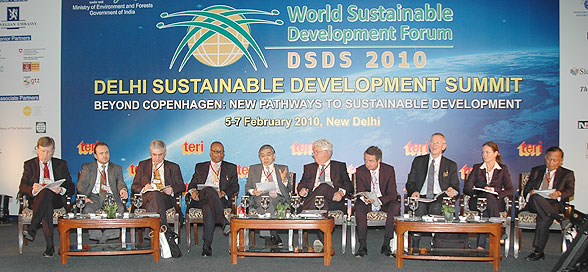5 February 2010
 |
|
|

Quote of the Day
India has full confidence in IPCC and in its
leadership and will support it.”
Dr Manmohan Singh
Quote of the Day
Knowledge is adequate, what is needed is adequate
political will."
Dr R K Pachauri
Quote of the Day
It will require governments, companies, shareholders, and civil society to work together. That is why this Summit is so important."
Dr Matthias Bichsel
Quote of the Day
There is a distinct and definite linkage between sustainability, resource conservation and global economy."
Mr Kris Gopalakrishnan
Quote of the Day
Collaboration of universities, businesses and public authorities are needed on this new paradigm of energy."
Mr Jean-Pascal Tricoire
Quote of the Day
We must do more to promote climate change resilient development."
Mr Haruhiko Kuroda
Quote of the Day
No global action can take place without national and individual actions."
Mr Pierre Jacquet
Quote of the Day
Concrete business leads to concrete reduction."
Ms Hilde M Tonne
Quote of the Day
I, as a youth of this country, feel responsible and believe that growth is not just about economic growth, but growth in a sustainable manner. As youth, we owe the responsibility to take care of the future." - YUVA Award winner
Mr Raghav Mimani

|
|
|
 |
Mainstreaming Climate Policies with development
 |
 The session was chaired by Mr Caio Koch-Weser, Vice Chairman,
Deutsche Bank, UK . He introduced the theme of the session
highlighting how political positions could change in the
next ten months leading up to COP 16 in Mexico. He stressed
the need for many-pronged strategies of smaller like-minded
countries, civil society groups, research institutions -
each acting independently but complementing one another.
The session was chaired by Mr Caio Koch-Weser, Vice Chairman,
Deutsche Bank, UK . He introduced the theme of the session
highlighting how political positions could change in the
next ten months leading up to COP 16 in Mexico. He stressed
the need for many-pronged strategies of smaller like-minded
countries, civil society groups, research institutions -
each acting independently but complementing one another.
There was an agreement that there is a great degree of convergence
between development policies and climate change policies.
The panel also stressed that there should enabling conditions
for technological innovation, public private partnership,
and capacity building for a low carbon development pathway.
|
 |
Keynote Speaker
 |
In his keynote address, he stressed on why efforts with
respect to climate change are so important as it is about
lives of people that we are striving everyday for. He
emphasized that the stakes for Asia are high and Asian
leaders should make every effort to improve lives of people,
and decrease the adverse effects of climate change on
food, water, fuel, health, and social security. He further
said that we must address climate change while working
towards MDGs, and that tackling climate change is not
an ‘Either-Or’ question. |
 |
|
|
|
|
|
|
|
|
|
|
| Mr Haruhiko Kuroda President,
ADB |
|
|
|
|
Speakers
 |
He emphasized on global collaboration between various stakeholders including governments, businesses, media, industry. He further highlighted - technological skills, regulations, and political will - as main ingredients for a successful and effective collaboration. |
 |
|
|
 |
He began his address by raising the issue of the convergence of climate change and development. He also gave some key inputs like - the need to create groups for climate change on finance and development; and recognizing finance as a key ingredient for climate change and development. |
 |
|
|
 |
He suggested creating a framework for national policy, mainstreaming climate change as a national development policy, integrating the capacity building technology coordination between departments to ensure north south cooperation; establishing climate mainstream fund by engaging different stakeholders. |
 |
|
|
|
|
|
|
| Mr Esko Aho Executive
Vice-President, Member of the group Executive Board, Nokia Corporation,
Finland, Executive Vice-President, Member of the group Executive
Board, Nokia Corporation, Finland |
|
Mr Juan P Bonilla Chief
of Climate Change Unit, Inter-American Development Bank, USA |
|
Mr Pierre Jacquet Executive
Director and Chief Economist, French Development Agency |
|
 |
He said that climate change interacts with all development challenges, and the governments should come forward with long-term plans to address these challenges and progress towards a low carbon economy. He advocated that we should mobilize ‘existing institutions that have credibility rather than creating new institutions’. |
 |
|
|
 |
He highlighted three key ingredients to address mainstreaming - credible finance and established experience; public and private sources of finance; and creating projects that need public finance initially, but later taken care of by private finance. |
 |
|
|
 |
He said we need to remember two words for mainstreaming - ‘Fast Start’, and mentioned three things needed for mainstreaming - measure progress, plan differently, and align incentives.
|
 |
|
|
|
|
|
|
| Mr Anthony Nyong Head of
OSUS Unit, African Development Bank, Tunisia |
|
Dr Ulrich Schroder Chairman
of the Managing Board, KfW, Germany |
|
Dr Andrew Steer Director General
for Policy and Research, DFID, UK |
|
|
|






